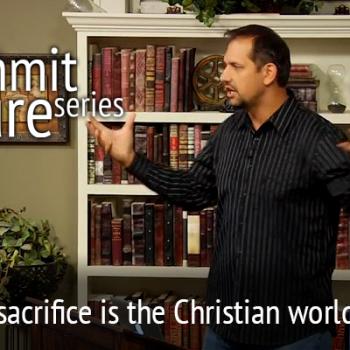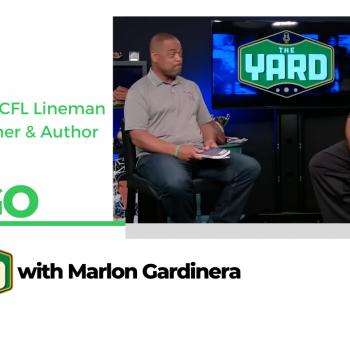
Last week, I introduced you ever-so-briefly to the subject of shepherds. This because Jesus drew our attention to all-things sheep-and-shepherd-related when He defined Himself by saying, “I AM the door (gate) of the sheep.”
This week, in this PODCAST, we’ll discover together exactly what Jesus meant when He identified Himself as the “door of the sheep.”
The important point to remember from last week is this: Life for the shepherd was and is unpredictable and oh-so-difficult.
You might remember that when his or her world is rocked by undeserved trauma of some sort, a shepherd will never ask the question of God, “Why?” Or “Why me?” It is a given that life in the desert is tough, and that problems are the norm.
Shepherds “get it” — that in this world of ours, bad things do indeed happen. Bad things do indeed happen to good people. We live in a world where, as but one example, men are born blind. And as Jesus made crystal-clear in John 9, it has nothing to do with the man’s sins, or his parents’ for that matter, as assumed by the disciples who asked Jesus about that very thing.
In the thinking of a shepherd, the evidence of the blessing of God in someone’s life is NOT the absence of problems or pain. The evidence of God’s blessing is His peace-giving presence that shepherds us through our problems and pain.
As Peter (who knew his fair share of suffering and pain) completely understood, Jesus is and ever will be our “Shepherd, the Guardian of our souls.” (1 Peter 2:25) A shepherd who guards our souls not from trouble, but while we are in the midst of trouble — undeserved, unpredictable, oh-so-difficult problems and personal pain.
Given all of that, what then did Jesus mean when He identified Himself as the “door of the sheep”? More than you can possibly imagine.
To get us started, Let’s read from the Gospel of John,
“You (the healed blind man) were born a total sinner!” they (the religious leaders) answered. “Are you trying to teach us?” And they threw him out of the synagogue. (John 9:34)
…so He (Jesus) explained to them (His followers): “I tell you the truth, I am the gate for the sheep. (John 10:7)
Now, as I said earlier, shepherds of any place or era know that life can be painful. Job, a shepherd himself, wrote:
People are born for trouble as readily as sparks fly up from a fire. (Job 5:7)
Life can be a grind, but God shepherds us through life’s pain.
The apostle Paul wrote so much in Romans 8:18-39,
18 I am sure that what we are suffering now cannot compare with the glory that will be shown to us. 19 In fact, all creation is eagerly waiting for God to show who his children are.20 Meanwhile, creation is confused, but not because it wants to be confused. God made it this way in the hope 21 that creation would be set free from decay and would share in the glorious freedom of his children. 22 We know that all creation is still groaning and is in pain, like a woman about to give birth.
23 The Spirit makes us sure about what we will be in the future. But now we groan silently, while we wait for God to show that we are his children. This means that our bodies will also be set free. 24 And this hope is what saves us. But if we already have what we hope for, there is no need to keep on hoping. 25 However, we hope for something we have not yet seen, and we patiently wait for it.
26 In certain ways we are weak, but the Spirit is here to help us. For example, when we don’t know what to pray for, the Spirit prays for us in ways that cannot be put into words.27 All of our thoughts are known to God. He can understand what is in the mind of the Spirit, as the Spirit prays for God’s people. 28 We know that God is always at work for the good of everyone who loves him. They are the ones God has chosen for his purpose,29 and he has always known who his chosen ones would be. He had decided to let them become like his own Son, so that his Son would be the first of many children. 30 God then accepted the people he had already decided to choose, and he has shared his glory with them.
31 What can we say about all this? If God is on our side, can anyone be against us?
32 God did not keep back his own Son, but he gave him for us. If God did this, won’t he freely give us everything else? 33 If God says his chosen ones are acceptable to him, can anyone bring charges against them? 34 Or can anyone condemn them? No indeed! Christ died and was raised to life, and now he is at God’s right side, speaking to him for us. 35 Can anything separate us from the love of Christ? Can trouble, suffering, and hard times, or hunger and nakedness, or danger and death? 36 It is exactly as the Scriptures say,
“For you we face death
all day long.
We are like sheep
on their way
to be butchered.”37 In everything we have won more than a victory because of Christ who loves us. 38 I am sure that nothing can separate us from God’s love—not life or death, not angels or spirits, not the present or the future, 39 and not powers above or powers below. Nothing in all creation can separate us from God’s love for us in Christ Jesus our Lord!
In light of Paul’s words, consider this: in John’s Gospel, Jesus invokes God’s exclusive name, I AM seven times, . Most often in metaphor: I am the Bread of Life; or I am the Light of the world… and in John 10:7, we get “I am the door” (and later in verse 14, Jesus says “I am the good shepherd”). This is in stark contrast to the religious leaders of Jesus’ day, who in John 9:34, kicked a recently healed man out of the synagogue, assuming his blindness came from his sin and therefore too dirty to step foot in the synagogue. They had deemed themselves “guards of the door” at the synagogue, and kept the poor man out, while Jesus declared Himself the gate, or door, to the sheep!
God spoke against this type of exploitation and harm through His prophet Jeremiah when he wrote:
Therefore thus says the Lord God of Israel against the shepherds who feed My people: “You have scattered My flock, driven them away, and not attended to them. Behold, I will attend to you for the evil of your doings,” says the Lord. (Jeremiah 23:2)
God doesn’t think too highly of bad shepherds, does He? Not then nor now. Thankfully, we now have the BEST shepherd in Jesus Christ.

And, in relationship to us, the Bible has a lot to say about the nature of sheep, thus enforcing the great reason Jesus called Himself the good shepherd. For example, look at Psalm 95:7,
The Lord is our God,
and we are his people,
the sheep he takes care of
in his own pasture.
Then there is Psalm 100:3,
You know the Lord is God!
He created us,
and we belong to him;
we are his people,
the sheep in his pasture.
This is oh so comforting!
But it begs the question… why sheep? Why does God use sheep to describe us and the good shepherd to describe Himself?
First off, sheep are loveable, huggable and gentle. I have met shepherds who look upon their sheep as we might a beloved pet. HOWEVER, and perhaps you can see how this relates to you and me, sheep are also notoriously fragile and vulnerable. As a function of our very humanness, we are very vulnerable and fragile people. And God knows this.
If left on their own, sheep will die. They are not able to find their own food or water; they don’t realize how vulnerable they are to nature’s elements; they are prone to wander aimlessly and follow each other to their peril.
Without a good shepherd in our lives, we don’t stand a chance.
Sheep (we) are also very trusting. This serves sheep well when they are in the care of a good shepherd, but it also puts them at severe risk in the hands of an evil shepherd.
And, this isn’t exclusive to misleading pastors, but anyone who wears the moniker of “Christian”, and yet treats people in an unChristlike fashion, and more like a prosecuting attorney, lording their authority, or false and judgmental accusations upon the sheep they have been put in position to care for.
Back to sheep, their most overarching characteristic is that they are ever so prone to wander off and wander away, as Isaiah wrote:
All of us, like sheep, have strayed away.
We have left God’s paths to follow our own. (Isaiah 53:6)
This also brings to mind Psalm 119:176,
I have wandered away like a lost sheep;
come and find me,
for I have not forgotten your commands.
Look, when we signed on to become a Christ-follower, this is a life-long venture. It is not a sprint. It is a marathon – a marathon that can last years and years if not decades upon decades. And it is so difficult to live in this world of ours with its banquet table of tempting “goodies” that may lead us astray like sheep. It’s challenging to maintain a vibrant and intimate walk with Jesus over a span of years. And, just like sheep, we are prone to walk away.
And since we are all so prone to wandering, perhaps we should be much more gracious to those in our respective folds who fall to the same temptations that confront us on a regular basis. Even the “best of us” can fall prey to “temporarily losing our minds” and go off the rails, in a spiritual sense; and make choices that boggle the mind.
But, we’re sheep. None of us are beyond the possibility of wandering away.
This is why a shepherd’s staff is curved at one end – so that when a sheep begins to wander, the shepherd can literally hook the lamb and guide it back to the fold.
This is why Jesus told the parable of the lost sheep:
“If a man has a hundred sheep and one of them gets lost, what will he do? Won’t he leave the ninety-nine others in the wilderness and go to search for the one that is lost until he finds it? (Luke 15:4)
That’s what a good shepherd does. He lovingly pursues wandering sheep in order to bring the lamb back to the safety of the shepherd’s fold.
“My people have been lost sheep.
Their shepherds have led them astray
and turned them loose in the mountains.
They have lost their way
and can’t remember how to get back to the sheepfold. (Jeremiah 50:6)
Jesus, the Good Shepherd, is the perfect shepherd… repeatedly and compassionately pursuing us and reminding us how to get back to His sheepfold! And, just like sheep, we also live in a world that is filled with temptations and even dangers, as John wrote:
Do not be surprised, my brothers and sisters, if the world hates you. (1 John 3:13)
As committed Christ-followers, we are living in a harsh – even hostile – spiritual environment. We need a place of safety. Every lamb does and every shepherd knows this. This is why, in John 10:7, Jesus said,
“I am the gate (door) for the sheep.”
You see, as shepherds and their sheep roam from place to place, searching for food and water, they would stop periodically and find a place to bed-down for the night. This is when the shepherd would construct his sheepfold. Sheepfolds were sturdy – built to last – not temporary structures like a pop-up tent. Over time, many of these sheepfolds would be constructed and left behind for another shepherd to come upon. They were often fairly easy to discover, as they were always built like a rock wall, in front of a cave. The cave would provide shelter, shade and cool from the heat, as well as insulation from the harsh nights or storms.
I also find it interesting that when Jesus was born, the One of whom John wrote, “…the Lamb of God who takes away the sins of the world” was born in a manger… A CAVE!
Jesus was born in a sheepfold!
Another picture I treasure is what a shepherd would do at night. After bringing his fold into the sheepfold and making sure they were all in safe, the shepherd would protect them by night. The trick is this: there wasn’t a swinging, lockable door or gate at the mouth of the sheepfold, so the shepherd would lay down at the “gate”; meaning that he not only exposed himself to the elements of the night weather, but also to the predators that stalked in the night with aims to harm his sheep.
9 I am the gate; whoever enters through me will be saved. They will come in and go out, and find pasture. 10 The thief comes only to steal and kill and destroy; I have come that they may have life, and have it to the full. (John 10:9-10)
Jesus was the one and only one who has the right to let His sheep into His eternal sheepfold and guards them against thieves and predators. He healed, secured and then discipled the blind man in John 9, and He stands guard, compassionately pursing us even today.

















